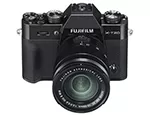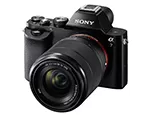About Fujifilm X-t3
Arguably one of the best new Mirrorless cameras on the market. Fujifilm is quietly staying in the background. Released at Photokina this year the X-t3 is an all-in-one for mirrorless users who want to shoot both stills and film. It’s a workhorse. Competitively priced it has a lot of flexibility with adjustable frame rates, resolutions, and decent 4k video shooting – the only thing missing is image stabilization, but an upgrade to the X-H1 gets you that with a bit larger of an investment. While Sony is still relying on Fujifilm for their lenses, the X-t3 has a decent line of lenses too which perform similarly. As a film camera this is a no-brainer, it has no current market share but performs just as well as those who do for a fraction of the price. The flexibility of this camera also produces the least “digital” looking image with a film-y feel to it. The downside is that it’s one of the least compatible and if you’re heavily invested in other brands you’ll have to start from scratch.
As an upgrade from the X-t2 there’s not a whole lot of “new” besides simply upgrading the existing tech, for example, the CMOS 3 sensor is now a CMOS 4 instead. If you’re considering upgrading from the X-t2, then this isn’t much different and probably not worth the consideration for the minimal improvement in speed and capability.
Features – Fujifilm X-t3
- APS-C sensor
- NTSC/PAL video recording up to 29 minutes 59 seconds
- 2160000 focusing point phase detection autofocus
- 36900000-pixel viewfinder
- 3” rear tilting LCD touchscreen
- Electronic and mechanical shutters
- Four exposure modes
- Up 30 FPS continuous shooting mode
- No built-in flash but up to 1/250 max sync speed
- Wi-Fi capable and Bluetooth 4.2
- Dual SD slots
- Several film simulation modes
- Black or Silver body
What’s New
- X-trans 4 sensor with 26.1 MPx with BSI
- A lower extended ISO range of 80 (compared to 100 on the X-t2)
- Upgraded viewfinder with a higher resolution.
- Newest autofocus system (similar to the X-t2 but upgraded with more points 117 vs. 91)
- Up to 40fps with the electronic shutter for video
- The pre-capture mode begins buffering before the shutter is pressed to allow for the delay in capturing.
- Digital microprism focus assist
- More advanced video capabilities with 4K UHD and DCI with up to 60 FPS
- 16 film simulation modes
- 390 shot battery life (up from 340 in the X-t2)
Who Should Buy
The Fujifilm X-t3 is definitely a filmmakers camera. With most of the modes and settings aimed at videographers, it’s still rather uninspiring when it comes to still photography. Fuji glass is still great quality, and this camera can stand its own against most mirrorless models which aren’t high end, but pro photographers will likely be disappointed in it. As an APS-C model, it’s also not a full frame, and that small sensor is going to hamper the photographer that wants good low-light capability. For the hobbyist or amateur looking to move into mirrorless then this is ideal as it’s much cheaper than some of the big brand version which only comes in full-frame.
How to Use – Get, Set, and Click
- 1On top right side use the AE dial to set the mode of the camera, for example, P, and confirm on the screen that it is correct.
- 2
Set the ISO by using the dial on the top left and then rotating the bottom of the dial for the drive mode to determine to focus. - 3
On the front of the body set your preference for manual or auto focus. - 4
Adjust the aperture on the lens to either auto or manual using the flip switch on the lens where it meets the body. - 5
Check your metering mode using the bottom of the right dial. - 6
Confirm all settings in the main screen then ready the camera to shoot. Make sure your fingers are not in front of the AF illuminator. - 7
Frame the picture and depress the shutter button halfway to focus if the frame is red and AF! Is displayed the camera is unable to focus? Consider switching to manual focus for poorly illuminated or difficult lighting. - 8
Depress the shutter button firmly to take the picture.
Must-Have Accessories for
Fujifilm X-t3

- Hot-shoe mounted flash unit
- Can be used as master/slave, dust and water resistant.
- Used for photography that has low or difficult lighting to properly illuminate images.
- Used by photographers who need extra light or more dynamic lighting but who don’t want to move strobes around.
- $382

- Adapter for using M lenses on the X mount
- Small, pancake format with electronic contacts for autofocus
- Used by photographers who have older glass and who wish to use it with the newer body. Caution should be used as some of the older lenses will not be compatible or may be too heavy for the coupling.
- $199

- Hot shoe mounted microphone
- Small and lightweight to fit onto mirrorless bodies without adding too much weight
- Used for improving the sound in video modes
- Mostly used by videographers who want better quality sound or who may not be up close to people speaking but need to capture the audio.
- $119
Similar Products to Watch Out For
-
 CANONEOS-1D C
CANONEOS-1D C -
 FUJIFILM X-T20
FUJIFILM X-T20 -
 NIKON D7200
NIKON D7200 -

Final Thoughts











